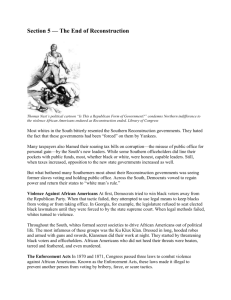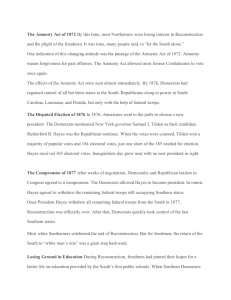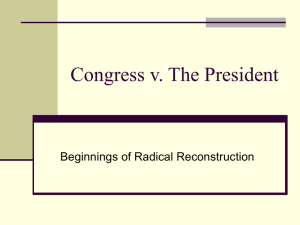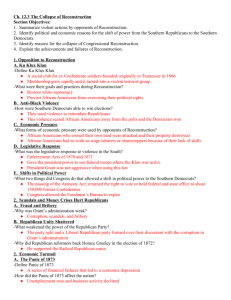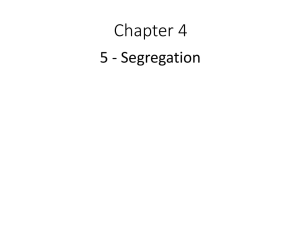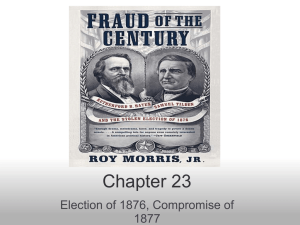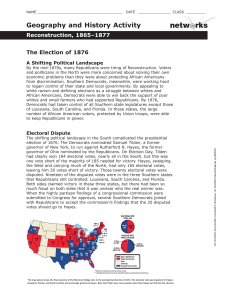End of Reconstruction: Textbook Excerpt
advertisement
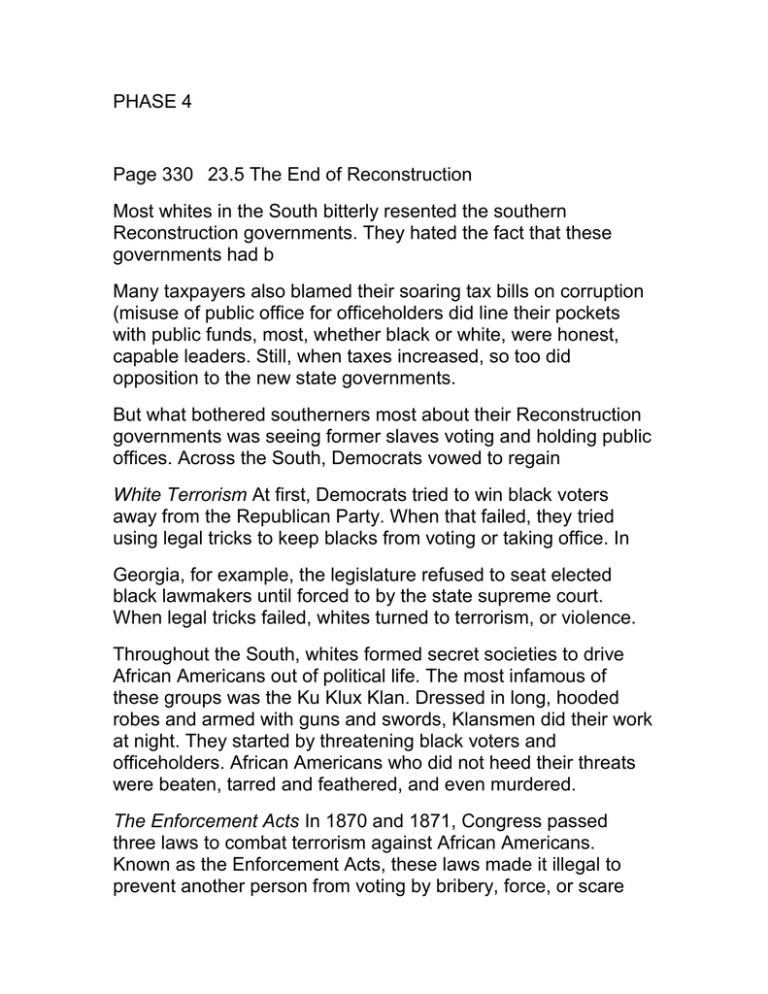
PHASE 4 Page 330 23.5 The End of Reconstruction Most whites in the South bitterly resented the southern Reconstruction governments. They hated the fact that these governments had b Many taxpayers also blamed their soaring tax bills on corruption (misuse of public office for officeholders did line their pockets with public funds, most, whether black or white, were honest, capable leaders. Still, when taxes increased, so too did opposition to the new state governments. But what bothered southerners most about their Reconstruction governments was seeing former slaves voting and holding public offices. Across the South, Democrats vowed to regain White Terrorism At first, Democrats tried to win black voters away from the Republican Party. When that failed, they tried using legal tricks to keep blacks from voting or taking office. In Georgia, for example, the legislature refused to seat elected black lawmakers until forced to by the state supreme court. When legal tricks failed, whites turned to terrorism, or violence. Throughout the South, whites formed secret societies to drive African Americans out of political life. The most infamous of these groups was the Ku Klux Klan. Dressed in long, hooded robes and armed with guns and swords, Klansmen did their work at night. They started by threatening black voters and officeholders. African Americans who did not heed their threats were beaten, tarred and feathered, and even murdered. The Enforcement Acts In 1870 and 1871, Congress passed three laws to combat terrorism against African Americans. Known as the Enforcement Acts, these laws made it illegal to prevent another person from voting by bribery, force, or scare tactics. President Grant sent troops into the South to enforce these acts. Hundreds of people were arrested for their terrorist activities. Those who were brought to trial, however, were seldom by speaking out against one of its members. (Caption) Ku Klux Klan members, shown above, were determined to prevent African Americans from participating in politics. Using threats, beatings, and even murder, the Klan eventually reestablished white Democratic rule in the South. Page 331 The Amnesty Act of 1872 By this time, however, most northerners were losing interest in ude was the passage of the Amnesty Act of 1872. (Amnesty means forgiveness for past offenses.) This law allowed most former Confederates to vote once again. The effects of the Amnesty Act were quickly seen. By 1876, Democrats had regained control of all but three states in the South. Republicans clung to power in South Carolina, Louisiana, and Florida, but only with the help of federal troops. The Disputed Election of 1876 In 1876, Americans went to the polls to choose a new president. The Democrats nominated New York governor Samuel J. Tilden as their candidate. Rutherford B. Hayes was the Republican nominee. When the votes were tallied, Tilden won a majority of popular votes and 184 electoral votes, just one short of the 185 needed for election. Hayes received 165 electoral votes. Twenty electoral votes from four states were in dispute. Congress, which was controlled by Republicans, appointed a commission to decide who should get the disputed votes. The commission awarded all 20 to Hayes, giving him exactly the 185 electoral votes he needed to win. Outraged Democrats in Congress threatened to block the election of anyone. Inauguration day drew near with no president in sight. The Compromise of 1877 At the last moment, the two parties agreed to compromise. Democrats allow Hayes to become president. In return, Hayes agreed to give southern states Once in office, President Hayes withdrew all remaining federal troops from the South. After that, Democrats quickly too Most white southerners cheered the end of Reconstruction. But for freedmen, the return of every state in (Caption) northern indifference to the violence that African Americans had to endure as Reconstruction ended.
